|
Books Should Be Free Loyal Books Free Public Domain Audiobooks & eBook Downloads |
|
|
Books Should Be Free Loyal Books Free Public Domain Audiobooks & eBook Downloads |
|
Non-fiction |
|---|
|
Book type:
Sort by:
View by:
|
By: Ohio Department of Industrial Relations [Compiler] | |
|---|---|
 Mining Laws of Ohio, 1921
Mining Laws of Ohio, 1921
| |
By: Arthur Henry Chamberlain (1870-1942) | |
|---|---|
 The Condition and Tendencies of Technical Education in Germany
The Condition and Tendencies of Technical Education in Germany
| |
By: Carrie Chapman Catt (1859-1947) | |
|---|---|
 Woman Suffrage By Federal Constitutional Amendment
Woman Suffrage By Federal Constitutional Amendment
| |
By: R. Lakeland | |
|---|---|
 The Teesdale Angler
The Teesdale Angler
| |
By: William Bodham Donne (1807-1882) | |
|---|---|
 Old Roads and New Roads
Old Roads and New Roads
| |
By: Sylvester Mowry (1830-1871) | |
|---|---|
 Memoir of the Proposed Territory of Arizona
Memoir of the Proposed Territory of Arizona
| |
By: Helen Ekin Starrett (1840-1920) | |
|---|---|
 Letters to a Daughter and A Little Sermon to School Girls
Letters to a Daughter and A Little Sermon to School Girls
Helen Ekin Starrett, journalist, mother of two daughters, grandmother of seven granddaughters and teacher to many young girls at the Starrett School for Girls offers lessons in life and religion to girls about to "pass out from the guardianship of home into life with its duties and trials". | |
By: William Cooper | |
|---|---|
 A Sketch of the Life of the late Henry Cooper Barrister-at-Law, of the Norfolk Circuit; as also, of his Father
A Sketch of the Life of the late Henry Cooper Barrister-at-Law, of the Norfolk Circuit; as also, of his Father
| |
By: John Marshall Barker (1849-1928) | |
|---|---|
 Colleges in America
Colleges in America
| |
By: Anonymous | |
|---|---|
 An Englishwoman's Love-Letters
An Englishwoman's Love-Letters
It need hardly be said that the woman by whom these letter were written had no thought that they would be read by anyone but the person to whom they were addressed. But a request, conveyed under circumstances which the writer herself would have regarded as all-commanding, urges that they should now be given to the world; and, so far as is possible with a due regard to the claims of privacy, what is here printed presents the letters as they were first written in their complete form and sequence. From book explaination | |
By: Unknown | |
|---|---|
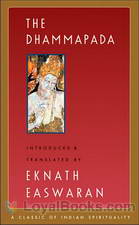 The Dhammapada
The Dhammapada
The Dhammapada is is a Buddhist scripture, containing 423 verses in 26 categories. According to tradition, these are verses spoken by the Buddha on various occasions, most of which deal with ethics. It is is considered one of the most important pieces of Theravada literature. Despite this, the Dhammapada is read by many Mahayana Buddhists and remains a very popular text across all schools of Buddhism. – Excerpted from Wikipedia | |
 The Meaning of the Glorious Koran
The Meaning of the Glorious Koran
The Koran (Qur’an) is regarded by Muslims as the word of God (Allah) as revealed to the prophet Muhammad. It is divided into 114 chapters (surahs), arranged roughly by length. This version, The Meaning of the Glorious Koran, is a widely used English translation of the Koran by a Muslim Englishman. Many Muslims, however, including Pickthall, believe that true translations of the Koran from the original Arabic are impossible, and see translations into other languages only as useful interpretations. | |
 The Good Housekeeping Marriage Book
The Good Housekeeping Marriage Book
A collection of articles from Good Housekeeping magazine, The Good Housekeeping Marriage Book focuses on the subject of marriage. With instructions and advice from courtship to raising children, this collection aims to assist those with questions and concerns surrounding marriage and the ensuing relationship. Published in 1938. | |
By: Anonymous | |
|---|---|
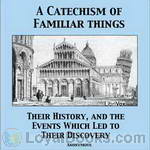 A Catechism of Familiar Things; Their History, and the Events Which Led to Their Discovery
A Catechism of Familiar Things; Their History, and the Events Which Led to Their Discovery
This book, a reprint of a successful English publication, has been so enlarged as to be to all intents and purposes new. It has been carefully revised by a Reverend gentleman, who for some time filled the chair of Physics and Chemistry in one of our colleges. Recent inventions and improvements are described in a simple, popular style, so as to be easily understood by all, and short notices are given of prominent inventors and scientists. The paragraphs relating to doctrinal matters conform in every respect to the teachings of the Church... | |
By: Unknown | |
|---|---|
 Byways Around San Francisco Bay
Byways Around San Francisco Bay
California, the land of sunshine and roses, with its genial climate, its skies as blue as the far-famed skies of Venice, and its pure, life-giving air, invites the lover of nature to take long tramps over hill and dale, mountain and valley, and to search out new trails in the rugged mountains. (Quote from section 2: Brook and Waterfall). | |
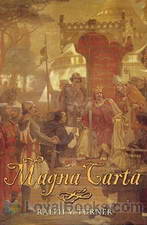 Magna Carta
Magna Carta
The original document is in Latin so this can only be a fairly rough approximation of the actual content. The text used is the first version in the Gutenberg collection. – Magna Carta is the most significant early influence on the long historical process that has led to the rule of constitutional law today. Magna Carta was originally created because of disagreements between the Pope, King John and his English barons over the rights of the King. Magna Carta required the king to renounce certain rights and respect certain legal procedures and to accept that the will of the king could be bound by law. | |
 The Ideal Bartender
The Ideal Bartender
Tom Bullock was a well-known bartender at the St. Louis Country Club. His skills as a bartender were so remarkable that a libel suit hinged on the excellence of his drinks. In The Ideal Bartender, Tom collects some of his best known beverage recipes. | |
By: Anonymous | |
|---|---|
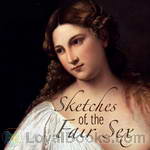 Sketches Of The Fair Sex
Sketches Of The Fair Sex
Sketches of the fair sex, in all parts of the world. To which are added rules for determining the precise figure, the degree of beauty, the habits, and the age of women, notwithstanding the aids and disguise of dress. It is our design to present a pleasing and interesting miscellany, which will serve to beguile the leisure hour, and will at the same time couple instruction with amusement. We have used but little method in the arrangement: Choosing rather to furnish the reader with a rich profusion... | |
 The American Housewife
The American Housewife
This cookbook and reference guide leads the American Housewife through how to make everything from Meat to Common Drinks, as well as helpful tips and tricks for any housewife! Also included in this fine text are sections on Cooking for The Sick, and how to make your own: Essences, Perfumes, Dyes and Soaps. This work also features an extensive section on The Art of Carving-Which covers anything you might need to carve! | |
By: Unknown | |
|---|---|
 The First Book of Adam and Eve
The First Book of Adam and Eve
The Conflict of Adam and Eve with Satan is a Christian pseudepigraphical work found in Ge’ez, translated from an Arabic original and thought to date from the 5th or 6th century AD. It was first translated from the Ethiopic version into German by August Dillmann. It was first translated into English by S. C. Malan from the German of Ernest Trumpp. The first half of Malan’s translation is included as the “First Book of Adam and Eve” and the “Second Book of Adam and Eve” in The Lost Books of the Bible and the Forgotten Books of Eden... | |
By: Anonymous | |
|---|---|
 English as She is Wrote
English as She is Wrote
"...Showing Curious ways in which the English Language may be made to convey Ideas or obscure them." A collection of unintentionally humorous uses of the English language. Sections of the work: How she is wrote by the Inaccurate, By Advertisers and on Sign-boards, For Epitaphs, By Correspondents, By the Effusive, How she can be oddly wrote, and By the Untutored. | |
By: Unknown | |
|---|---|
 A School History of the Great War
A School History of the Great War
A brief history of The Great War (World War I) designed for students in grades seven and eight. Special emphasis on European history leading up to the war, reasons and events leading to America’s eventual entering the war, and possible ramifications of the war for future generations. | |
By: Various | |
|---|---|
 My First Book
My First Book
This is not a children’s book, as may be supposed from the title, but a collection of essays first published in The Idler magazine, in which over twenty well-known writers describe with characteristic style and humour their experiences in producing their first book… and getting it published. The book is profusely illustrated, not only with portraits of the authors, but also with scenes and illustrations from the books discussed. Authors include Jerome K. Jerome, R. L. Stevenson, Bret Harte, Rider Haggard, Rudyard Kipling, Sir Arthur Conan Doyle and Mary Braddon... | |
By: Herbert J. Hall (1870-1923) | |
|---|---|
 The Untroubled Mind
The Untroubled Mind
A very wise physician has said that “every illness has two parts—what it is, and what the patient thinks about it.” What the patient thinks about it is often more important and more troublesome than the real disease. What the patient thinks of life, what life means to him is also of great importance and may be the bar that shuts out all real health and happiness. The following pages are devoted to certain ideals of life which I would like to give to my patients, the long-time patients who have especially fallen to my lot. | |
By: Plato (424/423 BC - 348/347 BC) | |
|---|---|
 Apology
Apology
The Apology of Socrates is Plato's version of the speech given by Socrates as he unsuccessfully defended himself in 399 BC against the charges of "corrupting the young, and by not believing in the gods in whom the city believes, but in other daimonia that are novel" (24b). "Apology" here has its earlier meaning (now usually expressed by the word "apologia") of speaking in defense of a cause or of one's beliefs or actions (from the Ancient Greek ἀπολογία). | |
By: Calista McCabe Courtenay | |
|---|---|
 George Washington
George Washington
In this biography for young people, Calista McCabe Courtenay takes the reader from George Washington the surveyor to his early military career, first as a colonel in the Virgina militia and then as a member of General Braddock'a staff during the French and Indian War. He later commanded the Virginia forces before joining the First Continental Congress. Much of the book is devoted to his campaigns during the American Revolution. At the end, we see him as President for two terms. | |
By: Unknown | |
|---|---|
 Pennsylvania Dutch Cooking
Pennsylvania Dutch Cooking
| |
By: Immanuel Kant (1724-1804) | |
|---|---|
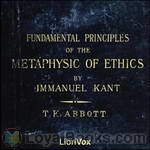 Fundamental Principles of the Metaphysic of Morals
Fundamental Principles of the Metaphysic of Morals
The Fundamental Principles of the Metaphysic of Morals, also known as The Groundwork of the Metaphysics of Morals or Foundations of the Metaphysics of Morals or Grounding of the Metaphysics of Morals, is Immanuel Kant's first contribution to moral philosophy. It argues for an a priori basis for morality. Where the Critique of Pure Reason laid out Kant's metaphysical and epistemological ideas, this relatively short, primarily meta-ethical, work was intended to outline and define the concepts and arguments shaping his future work The Metaphysics of Morals. However, the latter work is much less readable than the Fundamental Principles. | |
By: Theodore Roosevelt (1858-1919) | |
|---|---|
 The Naval War of 1812
The Naval War of 1812
Somewhat detailed history of naval engagements between the United States and England during the War of 1812, from a decidely American perspective. Completed by the author as a young man at age 24. After 120 years, it remains a standard study of the war. | |
By: Anonymous | |
|---|---|
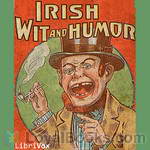 Irish Wit and Humor
Irish Wit and Humor
Excerpted anecdotes from the biographies of Swift, Curran, O'Leary and O'Connell, relating humorous snippets of politics in 18th and 19th century Ireland. For some these may be poignant in addition to being humorous and for others they may be humorous in addition to being poignant. ( | |
By: Jacob Abbott (1803-1879) | |
|---|---|
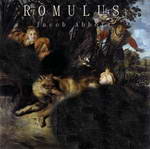 Romulus
Romulus
Jacob Abbott wrote many historical books for children. He was careful to ensure historical accuracy, and as he said himself in the preface to this book "Whatever of interest ... these stories may possess is due solely to the facts themselves which are recorded in them, and to their being brought together in a plain, simple, and connected narrative."This is the story of Romulus, the founding of Rome and the early years of its history, written in a way both readable and enjoyable for adults and children alike. | |
By: Thomas Troward (1847-1916) | |
|---|---|
 The Edinburgh Lectures on Mental Science
The Edinburgh Lectures on Mental Science
Thomas Troward was a divisional Judge in British-administered India. His avocation was the study of comparative religion. Influences on his thinking, as well as his later writing, included the teachings of Christ, Islam, Hinduism, and Buddhism. After his retirement from the judiciary in 1896, Troward set out to apply logic and a judicial weighing of evidence in the study of matters of cause and effect. The philosopher William James characterized Troward’s Edinburgh Lectures on Mental Science as "far and away the ablest statement of philosophy I have met, beautiful in its sustained clearness of thought and style, a really classic statement... | |
By: Various | |
|---|---|
 Prefaces and Prologues to Famous Books
Prefaces and Prologues to Famous Books
Charles W. Eliot, 21st President of Harvard University, edited this volume of prefaces ... authored by a Who's Who of World Literature: Bacon, Calvin, Caxton, Condell, Copernicus, Dryden, Fielding, Goethe, Heminge, Hugo, Johnson, Knox, Newton, Raleigh, Spenser, Taine, Whitman and Wordsworth. Eliot wrote in his preface to these prefaces, "No part of a book is so intimate as the Preface. Here, after the long labor of the work is over, the author descends from his platform, and speaks with his reader as man to man, disclosing his hopes and fears, seeking sympathy for his difficulties, offering defence or defiance, according to his temper, against the criticisms which he anticipates." | |
By: Plato (426-347 BCE) | |
|---|---|
 Meno
Meno
Meno (Ancient Greek: Μένων) is a Socratic dialogue written by Plato. Written in the Socratic dialectic style, it attempts to determine the definition of virtue, or arete, meaning in this case virtue in general, rather than particular virtues, such as justice or temperance. The goal is a common definition that applies equally to all particular virtues. Socrates moves the discussion past the philosophical confusion, or aporia, created by Meno's paradox (aka the learner's paradox) with the introduction of new Platonic ideas: the theory of knowledge as recollection, anamnesis, and in the final lines a movement towards Platonic idealism.. (Introduction by Wikipedia) | |
By: Max Stirner (1806-1856) | |
|---|---|
 The Ego and His Own
The Ego and His Own
In this book, his most famous, Max Stirner presents a philosophical case for a radical egoism that shuns the socially-oriented outlooks of both "establishment" ideologies and of revolutionaries in favor of an extreme individualism. The book is most widely talked about today only through the lens of other philosophers' thought: Karl Marx and Friedrich Engels launched a famous assault on it in The German Ideology, and some draw a connection between Stirner's thoughts here and Nietzsche's egoism a generation later. But it is worth reading in its own right, as much for its lyricism as the challenge of its philosophical proposals. | |
By: Anonymous | |
|---|---|
 True Stories of Wonderful Deeds
True Stories of Wonderful Deeds
37 short pieces perfect for newer recorders. These one page Stories of (mostly) Wonderful Deeds were written for Little Folk to teach them about famous incidents in their history. Bonnie Prince Charlie, Nelson and Hardy, Bruce and the Spider, David Livingston, Canute, Sir Philip Sydney, and Elizabeth and Raleigh are just some of the well known people and incidents covered in short stories. | |
By: Pierre Loti (1850-1923) | |
|---|---|
 War
War
Pierre Loti [Julien Viaud] (1850-1923) was a French naval officer and novelist. The present book is one of his few works of non-fiction, a small collection of letters and diary entries that describe his views and experiences in the wars and military operations in which he participated. Besides World War I, he also sheds light upon his views and involvement in the preparations for the Turkish Revolution of 1923, for which until today a famous hill and popular café in Istanbul are named after him. | |
By: H. G. Wells (1866-1946) | |
|---|---|
 Anticipations
Anticipations
Wells considered this book one of his most important, a natural follow-up to such works as his Man of the Year Million and The Time Machine. His goal was to get people to think and act in new ways. The book starts with a look at how humans get along socially and how they carry out their business ventures. It then discusses how these elements influence others, such as politics, the world of work, and education. H. G. tried to make clear how the current social order was disintegrating without preparing another to take its place. He then traced the roots of democracy, which in its present state he saw as unworkable. Instead, he proposed a new republic. He also critiqued modern warfare. | |
By: Nathaniel Hawthorne (1804-1864) | |
|---|---|
 Our Old Home
Our Old Home
These essays, based on Hawthorne’s stay in England from 1853 to 1857 as American Consul in Liverpool, were first published in the form of a series of travel articles for The Atlantic Monthly.In these writings, he displays his humor, his empathetic nature, his pride in his country, and sometimes his sharp judgment of others. He shares with us the difficulties of being a consul in the 1850’s, takes us on a tour with him through rural England and Scotland, shows us the splendors of London, and the horrors of the poverty that so many suffered. (Introduction by Margaret) | |
By: Charles Godfrey Leland (1824-1903) (1824-1903) | |
|---|---|
 The Mystic Will
The Mystic Will
This book presents a method of developing and strengthening the faculties of the mind, through the awakened will, by a simple, scientific process possible to any person of ordinary intelligence | |
By: Geoffrey H. Malins (1887-1943) | |
|---|---|
 How I Filmed the War
How I Filmed the War
An account of World War I and the experience of filming it by an early cinematographer (and, after the war, successful director) who was there. | |
By: Gaston Maspero (1846-1916) | |
|---|---|
 Manual of Egyptian Archaeology and Guide to the Study of Antiquities in Egypt
Manual of Egyptian Archaeology and Guide to the Study of Antiquities in Egypt
A handbook of Egyptian archaeology, issued by the British Museum, considered suitable for British tourists travelling to Egypt in the 19th Century. (Introduction by Timothy Ferguson) | |
By: Elizabeth Cady Stanton (1815-1902) | |
|---|---|
 Eighty Years and More; Reminiscences 1815-1897
Eighty Years and More; Reminiscences 1815-1897
Elizabeth Cady Stanton was one of the premier movers in the original women’s rights movement, along with Susan B. Anthony, her best friend for over 50 years. While Elizabeth initially stayed home with her husband and many babies and wrote the speeches, Susan went on the road to bring the message of the women’s rights movement to an often hostile public. When black men were given the vote in 1870, Susan and Elizabeth led the women’s rights establishment of the time to withhold support for a bill that would extend to black men the rights still denied for women of all colors... | |
By: Various | |
|---|---|
 The Jargon File, Version 4.2.2, 20 Aug 2000
The Jargon File, Version 4.2.2, 20 Aug 2000
| |
By: John Stuart Mill (1806-1873) | |
|---|---|
 Autobiography of John Stuart Mill
Autobiography of John Stuart Mill
John Stuart Mill (20 May 1806 – 8 May 1873), British philosopher, political economist, civil servant and Member of Parliament, was an influential liberal thinker of the 19th century. He was an exponent of utilitarianism, an ethical theory developed by Jeremy Bentham, although his conception of it was very different from Bentham's. He was a forceful proponent in the fight for government intervention in social reform. | |
By: Mary Huestis Pengilly | |
|---|---|
 Diary Written in the Provincial Lunatic Asylum
Diary Written in the Provincial Lunatic Asylum
Mary Pengilly was taken to a Lunatic Asylum by her sons where she kept a diary, which this book is taken from. Mary records the harsh conditions and treatments received at the hands of the nurses during her stay. Once Mary is released she takes it upon herself to make the authorities aware of the situation at the Provincial Lunatic Asylum. | |
By: Anonymous | |
|---|---|
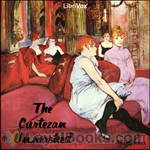 The Curtezan Unmasked
The Curtezan Unmasked
"The Curtezan unmasked or, the Whoredomes of Jezebel Painted to the Life: With Antidotes against them, or Heavenly Julips to cool Men in the Fever of Lust" is a fire-and-brimstone polemic by "A Spiritual Physician" to persuade young men not to succumb to harlotry and its accompanying perils. (Introduction by Denny Sayers) | |
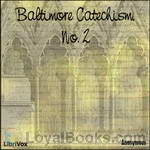 Baltimore Catechism, No. 2 -- Catechism of Christian Doctrine
Baltimore Catechism, No. 2 -- Catechism of Christian Doctrine
A catechism is a summary of the principles of Christian religion and articles of the faith. The Baltimore Catechism specifically was the de facto standard Catholic school text in the United States from 1885 to the late 1960s. It was the first such catechism written for Catholics in North America, replacing a translation of Bellarmine's Small Catechism. The Baltimore Catechism remained in use in nearly all Catholic schools until many moved away from catechism-based education, though it is still used up to this day in some. (Summary by Wikipedia) | |
By: James Parton (1822-1891) | |
|---|---|
 Captains of Industry
Captains of Industry
In this volume are presented examples of men who shed lustre upon ordinary pursuits, either by the superior manner in which they exercised them or by the noble use they made of the leisure which success in them usually gives. Such men are the nobility of republics.Most of these chapters were published originally in "The Ledger" of New York, and a few of them in "The Youths' Companion" of Boston, the largest two circulations in the country. I have occasionally had reason to think that they were of some service to young readers, and I may add that they represent more labor and research than would be naturally supposed from their brevity... | |
By: Samuel D. Gordon (1859-1936) | |
|---|---|
 Quiet Talks about Jesus
Quiet Talks about Jesus
So far as I can find out, I have no theory about Jesus to make these talks fit into. I have tried to find out for myself what the old Book of God tells about Him. And here I am trying to tell to others, as simply as I can, what I found. It was by the tedious, twisting path of doubt that I climbed the hill of truth up to some of its summits of certainty. I am free to confess that I am ignorant of the subject treated here save for the statements of that Book, and for the assent within my own spirit to these statements, which has greatly deepened the impression they made, and make... | |
By: Edgar Thurston (1855-1935) | |
|---|---|
 Omens and Superstitions of Southern India
Omens and Superstitions of Southern India
This book deals mainly with some aspects of what may be termed the psychical life of the inhabitants of the Madras Presidency, and the Native States of Travancore and Cochin. | |
By: James T. Nichols (1865-?) | |
|---|---|
 Birdseye Views of Far Lands
Birdseye Views of Far Lands
Birdseye Views of Far Lands is an interesting, wholesome presentation of something that a keen-eyed, alert traveler with the faculty of making contrasts with all classes of people in all sorts of places, in such a sympathetic way as to win their esteem and confidence, has been able to pick up as he has roamed over the face of the earth for a quarter of a century.The book is not a geography, a history, a treatise on sociology or political economy. It is a Human Interest book which appeals to the reader who would like to go as the writer has gone and to see as the writer has seen the conformations of surface, the phenomena of nature and the human group that make up what we call a "world... | |
By: Various (1833-1884) | |
|---|---|
 John Stuart Mill; His Life and Works
John Stuart Mill; His Life and Works
This biography is actually a series of essays by prominent personalities of the time that shed light on John Stuart Mill's life and areas of endeavor. Those areas include his experiences in India House, his moral character, certain botanical explorations, how effective he was as a critic, studies in morals and the law, and discoveries concerning political economy. They also explore ideas concerning his influence on institutions of higher learning, accomplishments as a politician, and fame as a philosopher. | |
By: Stephen Leacock (1869-1944) | |
|---|---|
 My Discovery of England
My Discovery of England
"In the course of time a very considerable public feeling was aroused in the United States and Canada over this state of affairs. The lack of reciprocity in it seemed unfair. It was felt (or at least I felt) that the time had come when some one ought to go over and take some impressions off England. The choice of such a person (my choice) fell upon myself. By an arrangement with the Geographical Society of America, acting in conjunction with the Royal Geographical Society of England (to both of whom I communicated my proposal), I went at my own expense."And from thence follow the impressions of Canadian political economist and humourist, Stephen Leacock, after a lecturing visit to England. | |
By: Plato (Πλάτων) (c. 428 BC - c. 347 BC) | |
|---|---|
 Republic (version 2)
Republic (version 2)
The Republic is a Socratic dialogue written by Plato around 380 BC concerning the definition of justice and the order and character of the just city-state and the just man. It is Plato's best-known work and has proven to be one of the most intellectually and historically influential works of philosophy and political theory. In it, Socrates along with various Athenians and foreigners discuss the meaning of justice and examine whether or not the just man is happier than the unjust man by considering a series of different cities coming into existence "in speech", culminating in a city (Kallipolis) ruled by philosopher-kings; and by examining the nature of existing regimes... | |
By: Various | |
|---|---|
 Encyclopedia from 1911 Volume 1 of 28
Encyclopedia from 1911 Volume 1 of 28
| |
By: Plato (Πλάτων) (c. 428 BC - c. 347 BC) | |
|---|---|
 Gorgias
Gorgias
This dialogue brings Socrates face to face with the famous sophist Gorgias and his followers. It is a work likely completed around the time of "Republic" and illuminates many of the spiritual ideas of Plato. The spirituality, as Jowett points out in his wonderful introduction, has many ideas akin to Christianity, but is more generous as it reserves damnation only for the tyrants of the world. Some of the truths of Socrates, as presented by Plato, shine forth in this wonderful work on sophistry and other forms of persuasion or cookery. | |
By: Martin Luther (1483-1546) | |
|---|---|
 Concerning Christian Liberty
Concerning Christian Liberty
Early in the course of the Reformation (1520) Martin Luther penned a trilogy of foundational documents addressing the Church, the Nobility and the Christian life. This document concerning the Christian life expounds the famous paradox: "A Christian man is the most free lord of all, and subject to none; a Christian man is the most dutiful servant of all, and subject to every one." | |
By: John D. Rockefeller (1839-1937) | |
|---|---|
 Random Reminiscences of Men and Events
Random Reminiscences of Men and Events
A good book by the oil revolutionist of the 20th century. As they say "Men should listen to experience" and this book is all about the experience of the second highest taxpayer of the US during the 20's. Though it is not in the book, this is a small poem he wrote:I was early taught to work as well as play,My life has been one long, happy holiday;Full of work and full of play-I dropped the worry on the way- And God was good to me everyday. | |